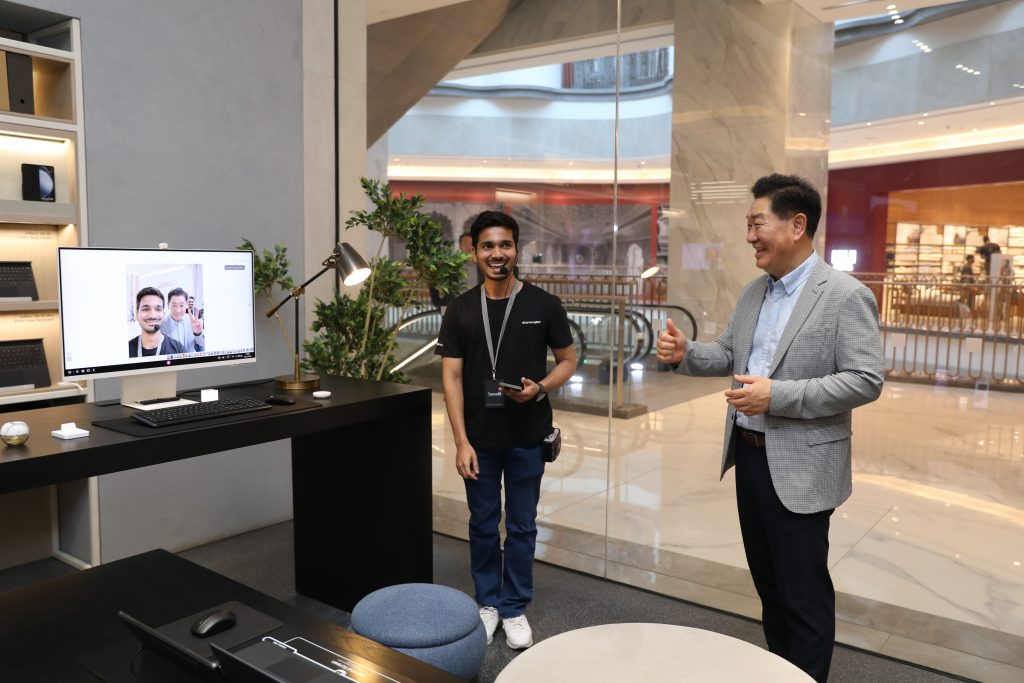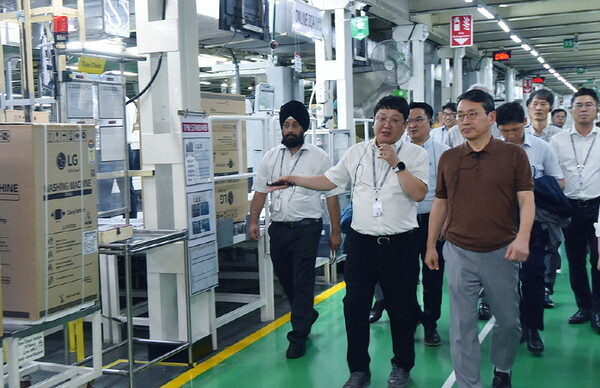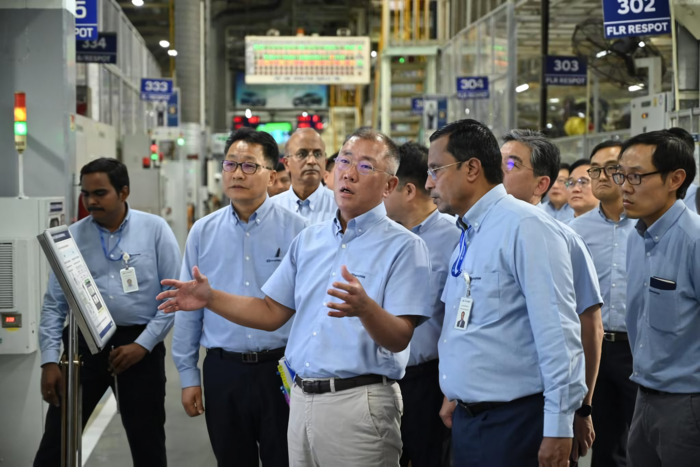[Hello India] Corporate Korea sees new growth drivers in India
By Jie Ye-eun, Moon Joon-hyunPublished : March 27, 2024 - 15:52

Amid the escalating US-China rivalry, global supply chains are being reshaped and India, the world’s fifth-largest economy, is getting fresh attention from South Korean tech giants.
India boasts the world’s largest population, at over 1.4 billion people, and a robust economy that has experienced substantial growth over the last three decades.
Korea’s major conglomerates, which have already secured a sizeable footing in the burgeoning market, are more recently pouring resources across industries as they relocate local operations from production to marketing to research and development.
“While China is increasingly turning into a closed economy, Korean companies are flocking to India, a more open and vibrant economy. Especially when the consumers’ purchasing power grows enough, the country will become one of the key growth drivers,” said Kim Dae-jong, a business administration professor at Sejong University.
Samsung Electronics
Samsung Electronics has accelerated its business expansion in India in an apparent move to derisk from China, where South Korea's biggest conflomerate has struggled to elevate sluggish sales. According to industry sources, the tech giant is not only betting big on the buying power of India's huge, young population, but also on making the country an integrated hub of manufacturing, sales and R&D.
Last week, Vice Chairman and co-CEO Han Jong-hee visited Samsung BKC, the company’s flagship connected lifestyle experience store located in Mumbai. Samsung BKC, which opened in January, marks Samsung’s first flagship brand store in India following launches in major cities such as New York and London.
Upon his visit to the store, he highlighted that India is one of the biggest and fastest-growing markets globally and offers a huge opportunity for Samsung. He also underlined the company’s commitment to the Indian market by bringing artificial intelligence and hyper-connectivity to its consumers there.
“India is the next big playground for AI and our flagship Samsung BKC store is an embodiment of our ‘AI for All’ vision and will showcase ‘One Samsung.’ … India has a large population of tech-savvy young consumers that inspire us to innovate. Here, thousands of young, enterprising youth work at our R&D centers to bring cutting-edge technologies such as AI to the world. We are proud of them,” the vice chairman said.
The company has been in India for over 28 years, having begun operations there in 1995. Chairman Lee Jae-yong has also maintained friendly ties with Prime Minister Narendra Modi. On several occasions, the Samsung chief has stressed his will to make Samsung become a “true local company” in India, not just a foreign investor.
Samsung has been operating the world’s largest mobile manufacturing plant in Noida, which is backed by the Indian government’s tax benefits. Its Chennai plant produces Samsung’s home appliances and TVs and Samsung R&D Institute India-Bangalore is the tech giant’s largest R&D center outside of Korea. Additionally, it recently established a chip research organization for solid-state storage devices for computers.
Samsung is also making efforts to win over Indian consumers by opening a series of premium experience stores in major cities there. As a result, it reclaimed the top spot in smartphone sales in India last year, holding a 19 percent market share, beating China's Vivo (18 percent), Xiaomi (17 percent) and Realme (12 percent), market research firm Canalys said. According to the company, the net profit earned by Samsung India Electronics came to 1.15 trillion won ($858 million) last year, more than doubling from the previous year's 508.5 billion won.
"Samsung has production corporations, research institutes and design organizations to produce products thoroughly optimized for local demand, and is significantly expanding its workforce there,” said an industry official who wished to be unnamed. “Because India’s young consumers have a keen interest in IT devices, in particular, Samsung is putting a lot of efforts to win their hearts.”
LG Electronics
LG Electronics, the world’s largest home appliance maker, has also seen stunning growth in India. Last year, its Indian unit posted 3.3 trillion won in sales, a 33.6 percent jump from 2.4 trillion won in 2018, according to a recent regulatory filing.

Like its crosstown rival Samsung, LG has also secured an extensive business network in the country ranging from sales to production to R&D.
More recently, the company has been betting on the soaring premium alliance market there. Last year, it invested about 31 billion won to expand the production of premium double-door refrigerators at its Pune facility while upping investment in the air conditioning segment with an annual growth rate of over 30 percent.
Another strategic focus is business-to-business beyond its leadership in TVs and home appliances. The firm has launched a series of showrooms across India for corporate clients, called Business Innovation Centers. After centers opened in Noida, Mumbai and Bengaluru, a fourth facility showcasing commercial displays and devices for hospitals, schools and offices recently opened in Chennai.
“LG Electronics has established itself as a premium brand in the Indian home appliance market. Based on that success, we see great potential in B2B now,” an LG official said.
LG aims to elevate the proportion of B2B sales from the current 10 percent to 25 percent of its total Indian sales in the longer term.
India’s home appliance market is expected to more than double from $10.93 billion in 2018 to $21.03 billion in 2025, according to the state-run Korea Trade-Investment Promotion Agency.
In the meantime, LG Energy Solution, the nation’s largest battery maker for electric vehicles, has established itself as a leading player in India’s electric two-wheeler market with a more than 50 percent market share. Its key clients include TVS Motor and Ola Electric, the top electric scooter manufacturers in India.
"We saw the opportunity in India's light EV market early on and set up a local sales team. This helped us meet customer needs fast and win their trust quickly within just a year," an official from LG Energy Solution said.
Hyundai Motor
Hyundai Motor Group, the world’s No. 3 carmaker, is already a major player in India, consistently holding the second-largest market share at about 15 percent. Kia, with its popular sport utility vehicle range, captured a 7 percent share of the Indian passenger car market in 2022. India accounts for 14 percent and 9 percent of Hyundai and Kia's worldwide sales, respectively, significantly outpacing other international competitors.

In January, Hyundai announced a substantial increase in its investment in India, with an additional 1 trillion won invested in Talegaon. Together with its initial investment in Tamil Nadu, the total investment adds up to 4 trillion won.
The new investment aims to transform the GM auto plant that Hyundai acquired into a manufacturing hub. The Talegaon plant has an annual production capacity of about 130,000 vehicles. Hyundai will bolster and upgrade its production facilities and begin full-scale operations next year.
The previous investment in Tamil Nadu announced last May includes establishing EV production facilities and charging infrastructure, and the creation the Hydrogen Valley Innovation Hub in partnership with the Indian Institute of Technology Madras, Hyundai's second hydrogen project after Guangzhou, China.
Hyundai-Kia already has a significant manufacturing presence in India, with Hyundai operating two complete car plants and Kia boasting the country's most high-tech automotive factory.
"In our global strategy, India's role is paramount, with our production capacity here set to double that of the US, which is currently at 700,000 units. Given the reduced operational capacity in China, below half of our (maximum there of) 1.5 million units, this emphasis on India becomes even more critical. With our future investments, we're aiming to transform India into our largest overseas production hub outside of South Korea," a Hyundai Motor Group official told The Korea Herald.
Local production is crucial for market entry in India, as imported vehicles face tariffs of 70 percent to 125 percent, set by the Modi government to boost domestic production.
"While Hyundai-Kia has successfully secured its position as the third-largest global automaker in recent years, surpassing its highest market share of 8.9 percent in 2014 remains elusive. A significant factor in this is the reduction of their market share in China from over 9 percent to less than 2 percent," said Moon Yong-kwan, an automotive analyst at Shin Young Securities.
"Despite the importance of established markets like the US and Europe, their relatively stable demand contrasts with the dynamic growth potential of emerging markets. Given the intensifying competition in China, Hyundai and Kia's strong performance in the Indian market could well compensate for their setbacks in China," he added.





















